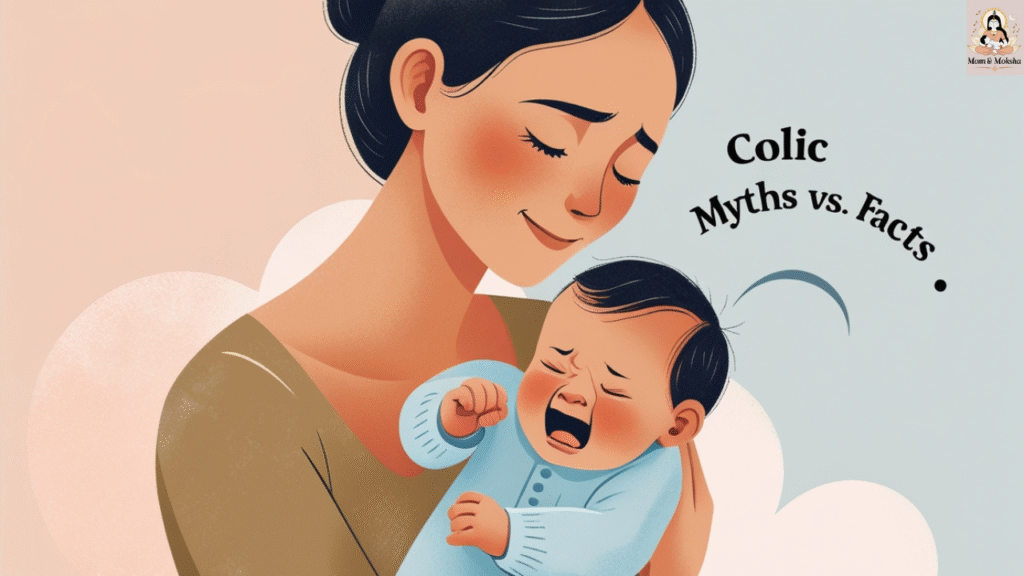Introduction
As a mom, one of the hardest things is hearing your baby cry and not knowing why.
Sometimes it’s just hunger, a wet diaper, or wanting to be cuddled. But when the crying is intense, frequent, and hard to soothe, two common suspects appear: colic and gas.
Colic in newborns and gas in babies are two of the most common reasons for excessive crying during the first months of life. While both can cause discomfort, sleepless nights, and worried parents, they are not the same—and understanding the difference can help you soothe your baby faster. In this post, we’ll explore how to tell if your baby’s crying is due to colic or gas, what the signs are, and gentle colic remedies that can help.
Colic is not a disease — it’s a temporary but challenging phase many newborns go through. Knowing what causes colic in a baby, how to recognize it, and the best newborn colic relief methods can make all the difference for you and your little one.
👉 “In moments of constant crying, even simple practices like Om chanting can help calm not just the baby, but also the parent’s mind.
Quick Guide: Colic vs. Gas in Babies
Colic vs Gas at a Glance
Colic:
Definition: Prolonged, intense crying in an otherwise healthy baby, often at the same time each day.
Key Sign: Hard to soothe, even after feeding and burping.
Typical Age: 2–3 weeks to 3–4 months.
Gas:
Definition: Air trapped in the baby’s stomach or intestines, causing temporary discomfort.
Key Sign: Crying improves after burping or passing gas.
Typical Age: Can happen at any time in infancy.
Main Difference:
Colic persists despite feeding and soothing, while gas-related crying improves once trapped air is released.
1. What is Colic? Understanding the Basics
A “colic baby” is a healthy, well-fed infant who cries for long periods without an obvious reason (Mayo Clinic). Doctors often follow the Rule of Threes: crying for more than 3 hours a day, 3 days a week, for over 3 weeks.

Colic vs Gas:
- Gas pain happens when air is trapped in your baby’s tummy and usually eases after burping or passing gas.
- Colic persists despite feeding, burping, and comforting.
“According to the American Academy of Pediatrics, colic affects up to 1 in 5 babies and usually resolves on its own.”
Symptoms and Signs of Colic in Babies
Knowing the colic symptoms in babies helps you distinguish it from normal fussiness. Common signs include:
- High-pitched, intense crying that starts suddenly.
- Crying episodes often occur at the same time each day, usually in the evening.
- Baby’s face turns red and fists clench.
- Pulling knees toward the chest while crying.
- Difficulty calming down despite soothing efforts, like after feeding or diaper change
👉 As parents, we often tend to hover anxiously during such phases—something I explored in my post on Helicopter Parenting and how it impacts both us and our children.
“As a new mom, I remember holding my tiny baby at 3 a.m., wondering if the crying would ever stop. I kept questioning myself — Was I missing something? Was he in pain? It was comforting to learn that colic doesn’t mean I’m doing something wrong — it’s simply a phase many babies go through.”
2. What is Gas in Babies?
Gas is simply air trapped in your baby’s stomach or intestines.
It can happen when your baby swallows air while feeding, crying, or from certain foods (passed through breastmilk or formula ingredients).
🔍 Common Signs of Gas in Newborns:
- More fussiness after feeding than at a set time of day
- Squirming, arching the back, or kicking legs during/after feeding
- Passing gas frequently
- A bloated or firm tummy
- Crying that improves after burping or passing gas
3. Colic vs Gas: Key Differences Table
| Signs | Colic | Gas |
| Timing of crying | Usually same time daily | Often after feeding |
| Duration | Long episodes (1-3 hours) | Shorter, relieved after burping/farting |
| Relief methods | Hard to soothe | Eases with burping, tummy massage |
| Associated symptoms | None, healthy growth | May have bloated tummy |
| Cause | Unknown, possibly digestive or nervous system maturity | Air swallowing or digestion issues |
Why It Matters
Identifying whether your baby has colic or gas can:
- Ensure you don’t miss a serious medical problem
- Help you choose the right soothing technique
- Avoid unnecessary worry or treatments
4. Causes of Colic in Newborns
Experts aren’t certain about the exact causes of colic in babies, but possibilities include:
- Immature digestive system struggling to process milk.
- Gas buildup leading to discomfort.
- Food sensitivities in breastfed babies (e.g., caffeine, dairy).
- Overstimulation from lights, noise, or activity.
👉 Traditional wisdom also highlights the role of herbs—like Tulsi, known for its digestive and healing properties—though nursing moms should always consume them mindfully.
5. Prevention: How to Avoid Colic in Babies
While you can’t always prevent colic, these tips may help:
- Feed your baby in an upright position.
- Burp after every feed to release trapped air.
- Use a slow-flow, anti-colic bottle to reduce swallowed air.
- Avoid overfeeding and let the baby take breaks while nursing.
6. Gentle Remedies for Both
💡 Remedies for Newborn Colic Relief:
a) Gripe Water for Babies

- Herbal remedy believed to soothe digestion.
- Always choose alcohol-free, sugar-free brands.
b) Infant Colic Drops
- Simethicone drops can help reduce gas bubbles.
- Follow pediatrician guidance before use.
c) Colic Pillow
- Specially designed pillow that supports baby’s tummy and back.
- May help ease discomfort after feeding.
💡 For Gas:
- Burp during and after feeds
- Try anti-colic bottles if bottle-feeding
- Baby tummy massage in clockwise motion
- Bicycling baby’s legs to help release gas
6. Baby Colic Treatments: What Helps Colic Babies?
- Gentle rocking or using a baby swing.
- Warm bath to relax tense muscles.
- Baby massage focused on tummy and legs.
- White noise & lullabies — you can try my Magic of Lullabies guide for music ideas.
- Tummy time to help move trapped gas.
7. How to Deal with a Colic Baby (For Moms)
Caring for a colicky baby can be overwhelming.
- Take breaks when you can — hand over to your partner or a trusted family member.
- Use baby carriers to keep your hands free while soothing.
- Join parenting support groups online or locally.
Before you buy anything, it’s good to know the truth behind common colic myths and facts.
8. When to Call the Doctor
Seek medical advice if your baby:
- Has persistent crying beyond 4 months
- Has fever
- Vomits frequently or forcefully
- Has blood in stools
- Refuses to feed
9. When Do Babies Grow Out of Colic?
Most babies grow out of colic naturally by 3 to 4 months of age, with symptoms gradually improving as their digestive and nervous systems mature. In some cases, mild colic-like crying may continue until around 5 to 6 months, but prolonged crying beyond that is uncommon and should be discussed with a pediatrician.
Gentle soothing techniques, proper feeding positions, and baby massage can help make this period more manageable until your baby naturally outgrows it.
10. Related Condition: Biliary Colic Treatment
The term “colic” is also used for adults experiencing gallbladder pain (biliary colic). While unrelated to baby colic, it’s worth noting so parents aren’t confused if they come across the term.
Biliary colic is different from infant colic—it’s a painful condition in adults caused by gallstones temporarily blocking the bile duct. The pain often comes in sudden waves, typically in the upper right abdomen, and can last from minutes to hours. While it may resolve on its own when the blockage clears, recurrent episodes often indicate an underlying gallbladder problem that needs medical attention. Biliary colic treatment focuses on relieving pain and preventing recurrence. Early medical evaluation is key to avoid complications such as cholecystitis or pancreatitis.
Conclusion
Every baby is unique. Some may have colic, some may just be gassy, and some may have both at different times.
What matters most is your calm presence and gentle care—babies can feel our stress, so breathe deeply and know you’re doing your best. Colic is a test of patience for parents, but with newborn colic remedies, prevention strategies, and emotional support, you can navigate this phase more smoothly
With time, both colic and gas improve naturally as your baby’s digestive system matures. Remember: you’re not alone, and your baby will outgrow it.
👉 At Mom & Moksha, I try to blend modern baby care with age-old wisdom—from newborn rituals like Annaprashan and Mundan to parenting reflections like Helicopter Parenting—so that moms like us feel guided at every stage.
What Parents Often Ask
Disclaimer: This information is for educational purposes only and should not replace professional medical advice. Always consult your pediatrician if you’re concerned about your baby’s crying.



